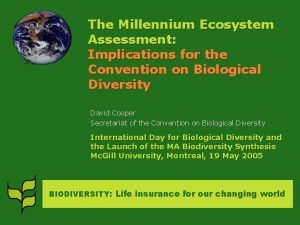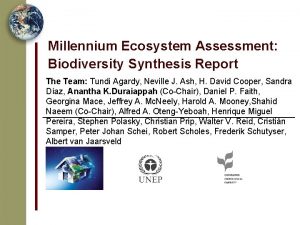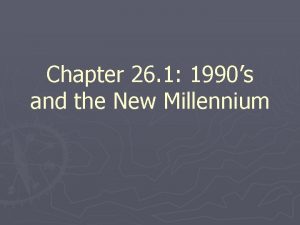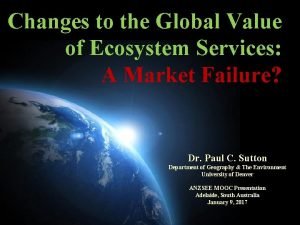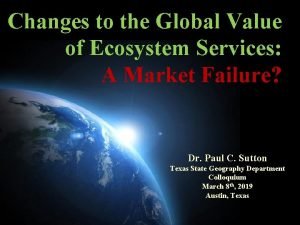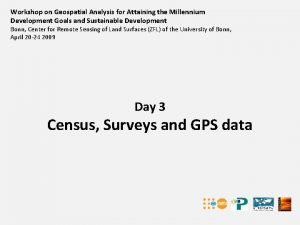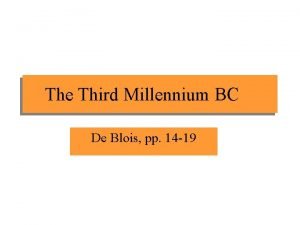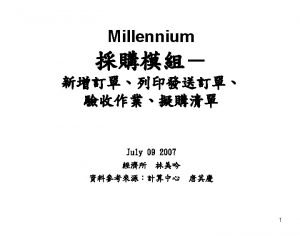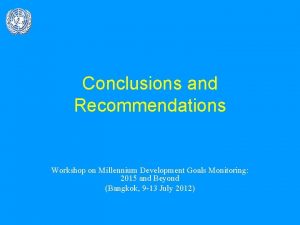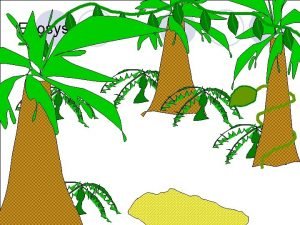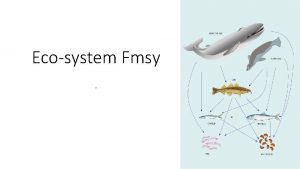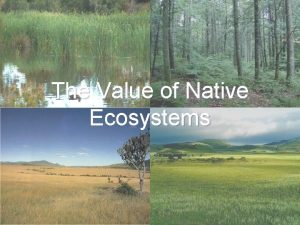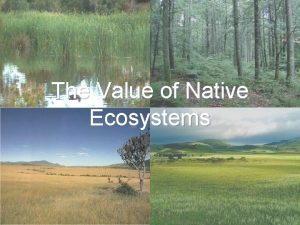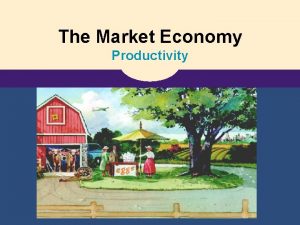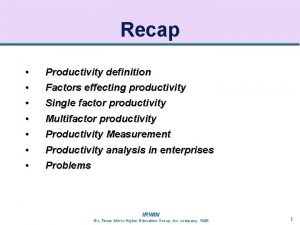Value of Ecosystems Productivity and The Millennium Ecosystem












- Slides: 12

Value of Ecosystems Productivity and The Millennium Ecosystem Assessment

BIOMASS (standing crop) PRODUCTIVITY (rate of biomass production) Satellite-derived estimates: Global primary production ~ 105 Gt C/yr Terrestrial habitats accounted for ~ 54% of total productivity but 3 x higher than oceanic productivity in g C/m 2 Sea-surface chlorophyll accounted for ~ 46% of total productivity but only ~ 0. 2% of total biomass Human impact: ~10% reduction of terrestrial NPP due to land changes ~24% of terrestrial NPP appropriated by humans

Values of Ecosystems • Provision Services- Goods that humans can use directly. • Regulating services- The service provided by natural systems that helps regulate environmental conditions. • Support systems- The support services that natural ecosystems provide such as pollination, natural filters and pest control. • Cultural services- Ecosystems provide cultural or aesthetic benefits to many people.

Millennium Ecosystem Assessment Overview

Largest assessment of the health of Earth’s ecosystems • Experts and Review Process • Prepared by 1360 experts from 95 countries • 80 -person independent board of review editors • Review comments from 850 experts and governments • Includes information from 33 sub-global assessments • Governance – Called for by UN Secretary General in 2000 – Authorized by governments through 4 conventions – Partnership of UN agencies, conventions, business, nongovernmental organizations with a multi-stakeholder board of directors

Finding #1 § Over the past 50 years, humans have changed ecosystems more rapidly and extensively than in any comparable period of time in human history § This has resulted in a substantial and largely irreversible loss in the diversity of life on Earth

Finding #2 § The changes that have been made to ecosystems have contributed to substantial net gains in human well-being and economic development § Since 1960, while population doubled and economic activity increased 6 -fold, food production increased 2 ½ times, food price has declined, water use doubled, wood harvest for pulp tripled, hydropower doubled. § But these gains have been achieved at growing costs that, unless addressed, will substantially diminish the benefits that future generations obtain from ecosystems

Degradation and unsustainable use of ecosystem services § Approximately 60% (15 out of 24) of the ecosystem services evaluated in this assessment are being degraded or used unsustainably § The degradation of ecosystem services often causes significant harm to human well-being and represents a loss of a natural asset or wealth of a country

The degradation of ecosystem services represents loss of a capital asset Loss of wealth due to ecosystem degradation is not reflected in economic accounts § Ecosystem services, as well as resources such as mineral deposits, soil nutrients, and fossil fuels are capital assets § Traditional national accounts do not include measures of resource depletion or of the degradation of these resources § A country could cut its forests and deplete its fisheries, and this would show only as a positive gain in GDP without registering the corresponding decline in assets (wealth) § A number of countries that appeared to have positive growth in net savings (wealth) in 2001 actually experienced a loss in wealth when degradation of natural resources were factored into the accounts

Increased likelihood of nonlinear changes § There is established but incomplete evidence that changes being made in ecosystems are increasing the likelihood of nonlinear changes in ecosystems with important consequences for human wellbeing Ø Fisheries collapse Ø Eutrophication and hypoxia Ø Disease emergence Ø Species introductions and losses Ø Regional climate change

Finding #3: § The degradation of ecosystem services could grow significantly worse during the first half of this century

Direct drivers growing in intensity Most direct drivers of degradation in ecosystem services remain constant or are growing in intensity in most ecosystems
 Millennium ecosystem assessment
Millennium ecosystem assessment Millennium ecosystem assessment
Millennium ecosystem assessment Millennium
Millennium Penciptaan nilai adalah
Penciptaan nilai adalah Chapter 26 section 1 the 1990s and the new millennium
Chapter 26 section 1 the 1990s and the new millennium Changes in the global value of ecosystem services
Changes in the global value of ecosystem services Changes in the global value of ecosystem services
Changes in the global value of ecosystem services Millennium geospatial
Millennium geospatial Third millennium
Third millennium Millennium prize problems
Millennium prize problems Innopac millennium
Innopac millennium Conclusion of millennium development goals
Conclusion of millennium development goals Millennium prize problems
Millennium prize problems

